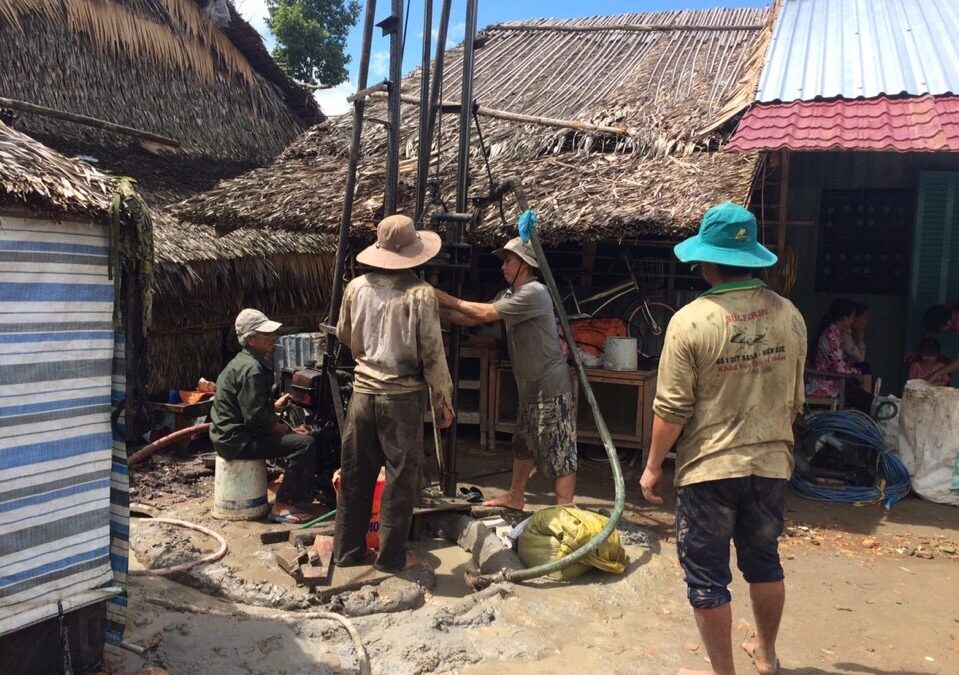
31 Jul 2017 | Focolare Worldwide
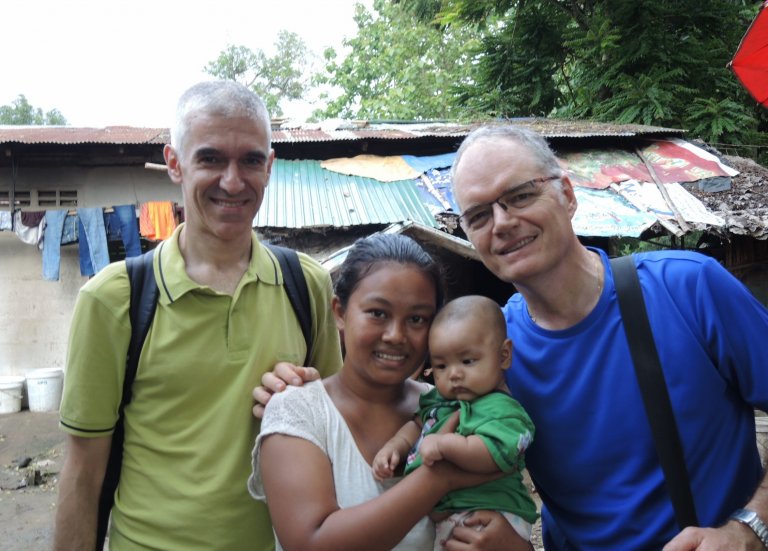 Ever since I began my experience in the focolare in Thailand in 1984 I’ve been in ongoing contact with the poor. In 1985, when we took our first trip to Burma – now Myanmar – I was able to touch the extreme poverty with my own hands; up until then I would never have had the opportunity to see it in person. Then, because the civil war in 1988, refugees began arriving from Thailand, especially in the border regions. Their condition? Illness, lonliness, desperation, exploitation and a great longing for a real life. For us focolarini, they represented a face of Jesus crucified and forsaken who we tried to lift up and love. Over these 32 years our help has surely been insufficient, as one can see from the recent humanitariann distaster that isn’t receiving a lot of reporting. No one is ever prepared for the pain of seeing people die. We’ve taken over a projejct begun by Father Justine, Burmese, who died after a long illness. He provided care for the children of migrants who were being left alone at home all day, and so we gave the last monies we had to be able to provide them hospitality. Now the school is called “Drop By Drop, the Latina Bridge Mae Sot.” It’s a collaborative effort between our children in Mae Sot that are originally Birmian and Karen and her friends from a school in Latina, Italy where several Focolare members work. It’s a bridge of solidarity which connects the two cities that are 10,000 km apart, and it has now involved some hundred poeple from many other places. A multi-national transport company helps us to take the containers of collected goods, paying all the customs and clearance fees (€ 1000) to their destination in Mae Sot on the mountains of Thailand.
Ever since I began my experience in the focolare in Thailand in 1984 I’ve been in ongoing contact with the poor. In 1985, when we took our first trip to Burma – now Myanmar – I was able to touch the extreme poverty with my own hands; up until then I would never have had the opportunity to see it in person. Then, because the civil war in 1988, refugees began arriving from Thailand, especially in the border regions. Their condition? Illness, lonliness, desperation, exploitation and a great longing for a real life. For us focolarini, they represented a face of Jesus crucified and forsaken who we tried to lift up and love. Over these 32 years our help has surely been insufficient, as one can see from the recent humanitariann distaster that isn’t receiving a lot of reporting. No one is ever prepared for the pain of seeing people die. We’ve taken over a projejct begun by Father Justine, Burmese, who died after a long illness. He provided care for the children of migrants who were being left alone at home all day, and so we gave the last monies we had to be able to provide them hospitality. Now the school is called “Drop By Drop, the Latina Bridge Mae Sot.” It’s a collaborative effort between our children in Mae Sot that are originally Birmian and Karen and her friends from a school in Latina, Italy where several Focolare members work. It’s a bridge of solidarity which connects the two cities that are 10,000 km apart, and it has now involved some hundred poeple from many other places. A multi-national transport company helps us to take the containers of collected goods, paying all the customs and clearance fees (€ 1000) to their destination in Mae Sot on the mountains of Thailand. 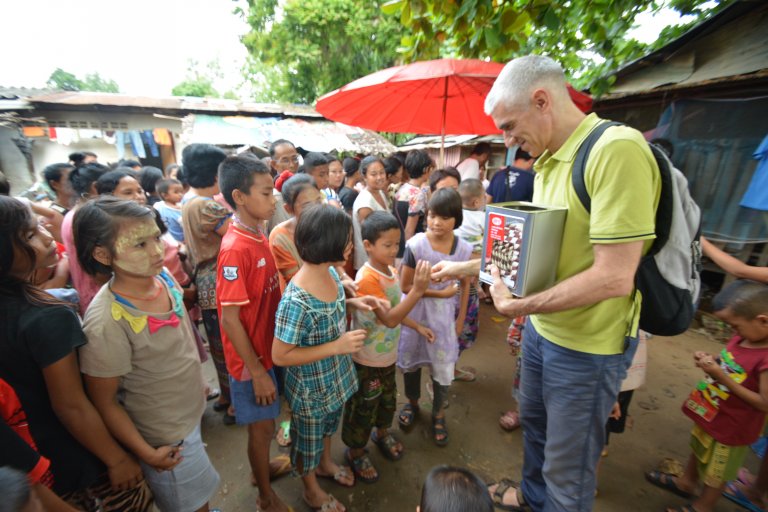 Currently, through Father Joachim from Myanmar, we are helping 200 people who are outside official refugee camps, undocumented and often without food. As Pope Francis puts it, we are experiencing what it means to “touch the flesh of Christ,” one of the many faces of Jesus Forsaken. Besides food, there is great need of love, warmth and affectioin… Chiara Lubich and our spirituality urge us to ‘make ourselves one’ with everyone. One of them said to us: ‘Thank you for everything you get for us,, but especially for making us feel loved. This gives us hope to live.’ There’s an association made up of some friends from Poschiavo in Switzerland, which has been recognized by the government and finances projects that are underway in Thailand, Laos and Vietnam. Six years later it seems like a real miracle!
Currently, through Father Joachim from Myanmar, we are helping 200 people who are outside official refugee camps, undocumented and often without food. As Pope Francis puts it, we are experiencing what it means to “touch the flesh of Christ,” one of the many faces of Jesus Forsaken. Besides food, there is great need of love, warmth and affectioin… Chiara Lubich and our spirituality urge us to ‘make ourselves one’ with everyone. One of them said to us: ‘Thank you for everything you get for us,, but especially for making us feel loved. This gives us hope to live.’ There’s an association made up of some friends from Poschiavo in Switzerland, which has been recognized by the government and finances projects that are underway in Thailand, Laos and Vietnam. Six years later it seems like a real miracle! 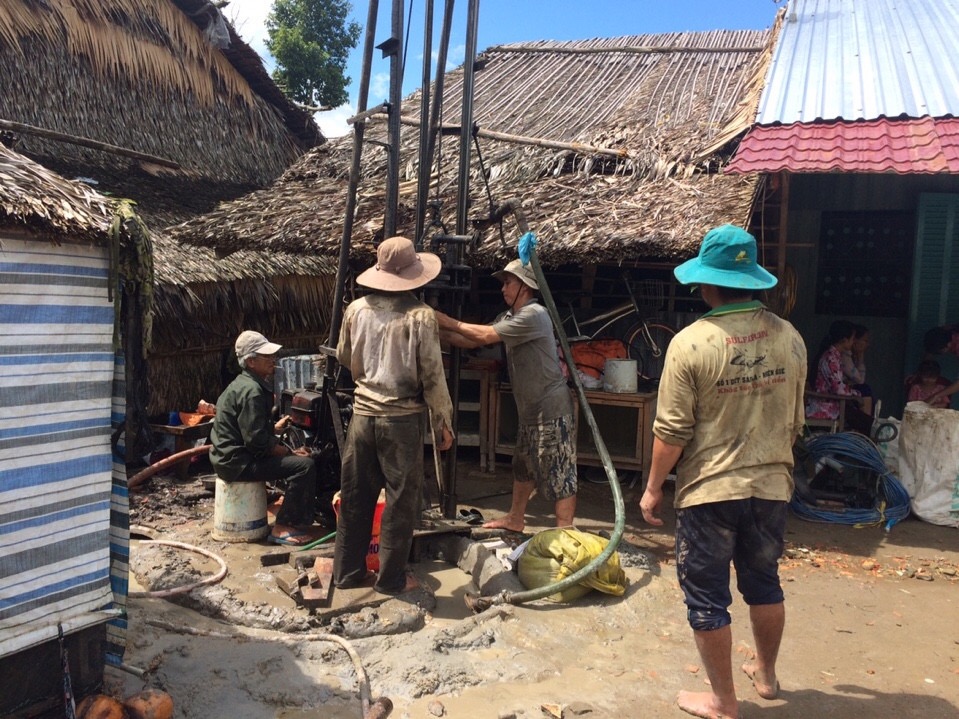 The projects in Vietnam are located in the southern zone, towards the Mekong Delta, in a parish. We build and repair small houses, wells with potable water; and we build bridges that are very useful for communication among the small islands.The so-called monkey bridges, constructed with bamboo stems are substituted with bridges made for humans with iron and cement. Now we’ve begun to work in the mountains too, in central Vietnam, in the zone of Gia Lai, which was known for the battles during the war. The Church is very involved in that zone and the poverty level has really reached levels of high concern in the mountain villages, especially among ethnic populations. In Laos we provide assistance for children through priests who have spent time at the priest school in Taygayta, Philippines. The help is sustained by genuine friendship, much creativity and a willingness to work. Love is like a bridge that joins everyone in a common dream: to live universal brotherhood concretely. Our budget? Free donations from many ordinary and also poor people. We feel that if God wants this project to carry on, he’ll provide for it. Luigi Butori Website: www.gocciadopogoccia.ch Facebook page
The projects in Vietnam are located in the southern zone, towards the Mekong Delta, in a parish. We build and repair small houses, wells with potable water; and we build bridges that are very useful for communication among the small islands.The so-called monkey bridges, constructed with bamboo stems are substituted with bridges made for humans with iron and cement. Now we’ve begun to work in the mountains too, in central Vietnam, in the zone of Gia Lai, which was known for the battles during the war. The Church is very involved in that zone and the poverty level has really reached levels of high concern in the mountain villages, especially among ethnic populations. In Laos we provide assistance for children through priests who have spent time at the priest school in Taygayta, Philippines. The help is sustained by genuine friendship, much creativity and a willingness to work. Love is like a bridge that joins everyone in a common dream: to live universal brotherhood concretely. Our budget? Free donations from many ordinary and also poor people. We feel that if God wants this project to carry on, he’ll provide for it. Luigi Butori Website: www.gocciadopogoccia.ch Facebook page

28 Jul 2017 | Focolare Worldwide
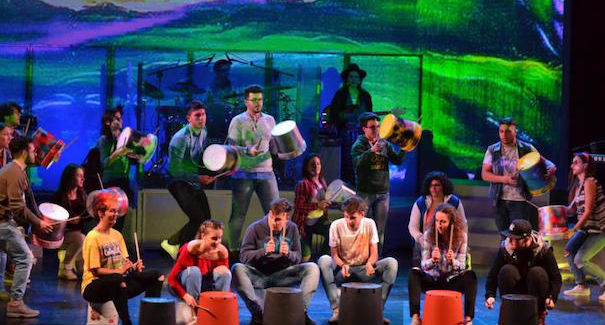 When the international group Gen Verde passed through the city and school where Tiziana teaches, there were positive effects in her relationships with students. In particular, when she heard at the end of the course that one of them had declared themselves an atheist, she decided to write to him. The student’s response was unexpected. “Dear Luca, at this point we are at the end of your school journey. I wanted to write you a note because I didn’t get the chance to chat. So I’m doing so for no particular reason, only because I like having exchanges like this. I would have also liked to ask you about your atheism, as (Italian comic) Checco Zalone would say, but didn’t get the time. I’m convinced that there are no real atheists, only different sorts of believers. The longing for the infinite that consumes our souls is too strong. In my life, I made a fundamental discovery that changed me radically: that God loves me, and each of us, like crazy. Perhaps I would have also been an atheist if I had not gotten to know this God. Love touches all of us, and we madly thirst for it. If you, like me, believe in love, both of us are believers in a way. If your atheism brings you to not believe in a cruel, judging, cold, indifferent prime mover, grand architect, supreme being etc., etc. – then I too am an atheist with you! I can only believe in a God who was flesh and bones, who out of love was born, became man, died and rose. “Bye Luca, I just wanted to say thank you for these past years that we spent together!”
When the international group Gen Verde passed through the city and school where Tiziana teaches, there were positive effects in her relationships with students. In particular, when she heard at the end of the course that one of them had declared themselves an atheist, she decided to write to him. The student’s response was unexpected. “Dear Luca, at this point we are at the end of your school journey. I wanted to write you a note because I didn’t get the chance to chat. So I’m doing so for no particular reason, only because I like having exchanges like this. I would have also liked to ask you about your atheism, as (Italian comic) Checco Zalone would say, but didn’t get the time. I’m convinced that there are no real atheists, only different sorts of believers. The longing for the infinite that consumes our souls is too strong. In my life, I made a fundamental discovery that changed me radically: that God loves me, and each of us, like crazy. Perhaps I would have also been an atheist if I had not gotten to know this God. Love touches all of us, and we madly thirst for it. If you, like me, believe in love, both of us are believers in a way. If your atheism brings you to not believe in a cruel, judging, cold, indifferent prime mover, grand architect, supreme being etc., etc. – then I too am an atheist with you! I can only believe in a God who was flesh and bones, who out of love was born, became man, died and rose. “Bye Luca, I just wanted to say thank you for these past years that we spent together!”  “Dear Prof, it gives me the greatest pleasure to know that even beyond the school environment you still wanted to stay in touch (not that I didn’t already know, but this confirmed it). I too would have liked to discuss with you a number of wider topics, from politics to religion. I have always admired your availability and open mindedness, your ability to dialogue, listen, understand and take in others’ opinions, even if they were completely different from your own. I have always considered your perspective very important. Among other things, you taught me that changing my point of view is fundamental to understanding others, and above all ourselves. This year, together with some schoolmates of mine, I attended PULSE, the May 1 celebration at the little city of Loppiano. During our stay, we were hosted by the Sophia University Institute, where young people from all over the world continue their studies after having graduated. It was there that, for me, I experienced firsthand what equality and fraternity mean. This was thanks to the way we were generously welcomed by the institute’s students and teachers, who treated us as if we had known each other for a lifetime. What struck me most happened during the evening of the second day, when we ate together with our hosts. They had prepared the meal with passion, just for us, using everything they had in the kitchen. In that moment, despite being more than 1,000km from my city, I felt at home. I found myself at table talking about this and that with two from Lebanon and others from Germany, Cuba, Argentina, Colombia, and Bologna, sharing a plate of meat, spinach, potatoes and onions. After that we stayed up late talking about our experiences, plans, playing guitar, singing songs and sourcing a bit of wine from the German black forest. In that moment PULSE, at least for me, had achieved its goal. Thanks Prof, till next time!”
“Dear Prof, it gives me the greatest pleasure to know that even beyond the school environment you still wanted to stay in touch (not that I didn’t already know, but this confirmed it). I too would have liked to discuss with you a number of wider topics, from politics to religion. I have always admired your availability and open mindedness, your ability to dialogue, listen, understand and take in others’ opinions, even if they were completely different from your own. I have always considered your perspective very important. Among other things, you taught me that changing my point of view is fundamental to understanding others, and above all ourselves. This year, together with some schoolmates of mine, I attended PULSE, the May 1 celebration at the little city of Loppiano. During our stay, we were hosted by the Sophia University Institute, where young people from all over the world continue their studies after having graduated. It was there that, for me, I experienced firsthand what equality and fraternity mean. This was thanks to the way we were generously welcomed by the institute’s students and teachers, who treated us as if we had known each other for a lifetime. What struck me most happened during the evening of the second day, when we ate together with our hosts. They had prepared the meal with passion, just for us, using everything they had in the kitchen. In that moment, despite being more than 1,000km from my city, I felt at home. I found myself at table talking about this and that with two from Lebanon and others from Germany, Cuba, Argentina, Colombia, and Bologna, sharing a plate of meat, spinach, potatoes and onions. After that we stayed up late talking about our experiences, plans, playing guitar, singing songs and sourcing a bit of wine from the German black forest. In that moment PULSE, at least for me, had achieved its goal. Thanks Prof, till next time!”
25 Jul 2017 | Focolare Worldwide, Senza categoria

22 Jul 2017 | Focolare Worldwide, Senza categoria
 Augustine provides us with one of the most valuable intuitions on prayer: “God’s ear hears the heart’s voice” (Comment on Psalm 148). Letting God’s ear rest on our heart, opening our heart to God’s ear: this is what it takes, this is the art of praying, an art, by the way, that’s for everyone. Actually, it’s not ours, but of the Spirit that God gives to us, the Spirit who prays in us, for we don’t know how or for what we should pray (cf Rm 8:26). […] Prayer is elevating the heart to God. But are we capable of that? Isn’t the range of our understanding too limited for our heart to be able to elevate itself to God? Isn’t the impulse of our heart too weak? Don’t burdens attach themselves to our heart and weigh on it, paralyze it and bring it down? What gives us the courage to claim: Our heart is turned to the Lord? His ear. He has lowered it to us. The Father listens to the Son. And the Son came down among us, into our flesh, into our heart. Within the heart of the Son, the Father listens to every beat of our heart, in the heart of the Son he finds our heart. In Him in whom we were made, loved, supported, gathered – the Father hears us. To elevate our heart means to leave it where it is and discover that where it is, with us, is the heart of God in the heart of his Son. Abandon yourself in Him and he will hold you. In Him, God’s ear is upon your heart; in Him your heart is at God’s ear. […] The opposite is just as true: God keeps his heart against your ear. He revealed, conveyed, gave, not something of Himself, but His Self. If you believe in him, if you adhere to Him, if you stick to Him, then you don’t hear a novelty, a directive, a command: you hear his heart. Stay near to Him until you discover this heart of yours. He’s in need of your patient listening in order to open your heart; actually, only patience comprehends love and learns love. He will reveal Himself to anyone who loves Him, and He makes His dwelling with that person (cf Jn 14:21-23). […] God has your heart at his ear, so that through your ear his heart penetrating your heart, might become your heart. The ear of God on your heart – the heart of God at your ear – like the alternating found in prayer. Only the pray-er knows God. Only the pray-er knows the human person. From Klaus Hemmerle, Con l’anima in ascolto, Guida alla preghiera,(Rome: Città Nuova Ed.,1989), 9-11.
Augustine provides us with one of the most valuable intuitions on prayer: “God’s ear hears the heart’s voice” (Comment on Psalm 148). Letting God’s ear rest on our heart, opening our heart to God’s ear: this is what it takes, this is the art of praying, an art, by the way, that’s for everyone. Actually, it’s not ours, but of the Spirit that God gives to us, the Spirit who prays in us, for we don’t know how or for what we should pray (cf Rm 8:26). […] Prayer is elevating the heart to God. But are we capable of that? Isn’t the range of our understanding too limited for our heart to be able to elevate itself to God? Isn’t the impulse of our heart too weak? Don’t burdens attach themselves to our heart and weigh on it, paralyze it and bring it down? What gives us the courage to claim: Our heart is turned to the Lord? His ear. He has lowered it to us. The Father listens to the Son. And the Son came down among us, into our flesh, into our heart. Within the heart of the Son, the Father listens to every beat of our heart, in the heart of the Son he finds our heart. In Him in whom we were made, loved, supported, gathered – the Father hears us. To elevate our heart means to leave it where it is and discover that where it is, with us, is the heart of God in the heart of his Son. Abandon yourself in Him and he will hold you. In Him, God’s ear is upon your heart; in Him your heart is at God’s ear. […] The opposite is just as true: God keeps his heart against your ear. He revealed, conveyed, gave, not something of Himself, but His Self. If you believe in him, if you adhere to Him, if you stick to Him, then you don’t hear a novelty, a directive, a command: you hear his heart. Stay near to Him until you discover this heart of yours. He’s in need of your patient listening in order to open your heart; actually, only patience comprehends love and learns love. He will reveal Himself to anyone who loves Him, and He makes His dwelling with that person (cf Jn 14:21-23). […] God has your heart at his ear, so that through your ear his heart penetrating your heart, might become your heart. The ear of God on your heart – the heart of God at your ear – like the alternating found in prayer. Only the pray-er knows God. Only the pray-er knows the human person. From Klaus Hemmerle, Con l’anima in ascolto, Guida alla preghiera,(Rome: Città Nuova Ed.,1989), 9-11.
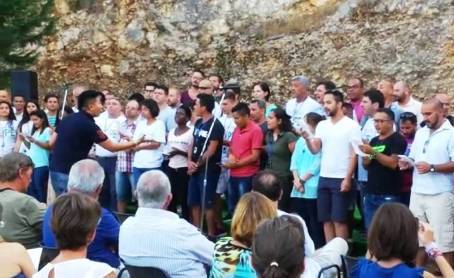
21 Jul 2017 | Focolare Worldwide
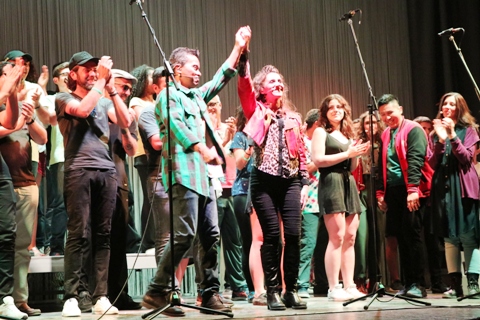 “Every life has hope.” This is the recurring theme of Fazenda da Esperança in all of its locations around the world. “We’ve seen and lived through hell, but during these days we’ve been changed into artists.” This was one of the statements gathered during an exchange of experiences at the conclusion of the five days of work that included two presentations of “Campus – The Musical”. A hundred and ten young people from Fazenda da Esperança and from Puglia, southern Italy, were prepared in workshops on dance, voice, theatre and percussion to then go out on stage with Gen Rosso at the Fasano city Kennedy Theatre for several scenes of Campus, last 7th and 8th of July. “We had to learn it fast and well in spite of the heat and our own limitations.” The motto helped: Welcome the different. There were people from 15 countries, from different cultures, age groups and backgrounds…”
“Every life has hope.” This is the recurring theme of Fazenda da Esperança in all of its locations around the world. “We’ve seen and lived through hell, but during these days we’ve been changed into artists.” This was one of the statements gathered during an exchange of experiences at the conclusion of the five days of work that included two presentations of “Campus – The Musical”. A hundred and ten young people from Fazenda da Esperança and from Puglia, southern Italy, were prepared in workshops on dance, voice, theatre and percussion to then go out on stage with Gen Rosso at the Fasano city Kennedy Theatre for several scenes of Campus, last 7th and 8th of July. “We had to learn it fast and well in spite of the heat and our own limitations.” The motto helped: Welcome the different. There were people from 15 countries, from different cultures, age groups and backgrounds…” 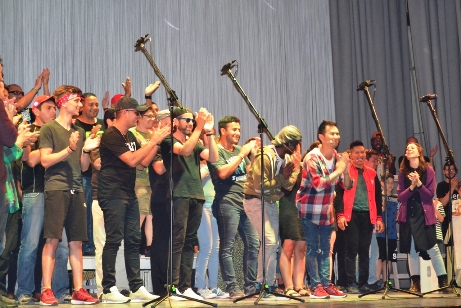 Our adrenaline was really pumping just as we got on stage to give the best of ourselves, while fear and worry seemed to disappear as we encouraged each another. Several said: “We felt a strength from above that was supporting us and instilling faith in ourselves.” “The thing I learned was never to stop during the show because of a mistake: this made me think a lot. I’ll carry this into my daily life, always continuing on in spite of the failures.”
Our adrenaline was really pumping just as we got on stage to give the best of ourselves, while fear and worry seemed to disappear as we encouraged each another. Several said: “We felt a strength from above that was supporting us and instilling faith in ourselves.” “The thing I learned was never to stop during the show because of a mistake: this made me think a lot. I’ll carry this into my daily life, always continuing on in spite of the failures.”  The inauguration of a new Fazenda da Esperança was held on Sunday, July 9, in Monopoli. It was attended by civil and religious leaders, Gen Rosso and a group of 60 youth “missionaries” from the Fazende, who came from around the world, together with their founders. The experience of several young people who had been in prison and were now helping other young people like themselves, was quite meaningful. “For us from Gen Rosso,” Franco explains, “collaborating with the Fazenda, as we have been for many years, is always a great enrichment and gives a decisive push to welcome the strong signs of hope that can be found anywhere in the world.” The festival concluded with the singing of Io ero lì (I’ve been there), a song written by Gen Rosso in tribute to Fazenda da Esperança. Gustavo Clariá
The inauguration of a new Fazenda da Esperança was held on Sunday, July 9, in Monopoli. It was attended by civil and religious leaders, Gen Rosso and a group of 60 youth “missionaries” from the Fazende, who came from around the world, together with their founders. The experience of several young people who had been in prison and were now helping other young people like themselves, was quite meaningful. “For us from Gen Rosso,” Franco explains, “collaborating with the Fazenda, as we have been for many years, is always a great enrichment and gives a decisive push to welcome the strong signs of hope that can be found anywhere in the world.” The festival concluded with the singing of Io ero lì (I’ve been there), a song written by Gen Rosso in tribute to Fazenda da Esperança. Gustavo Clariá
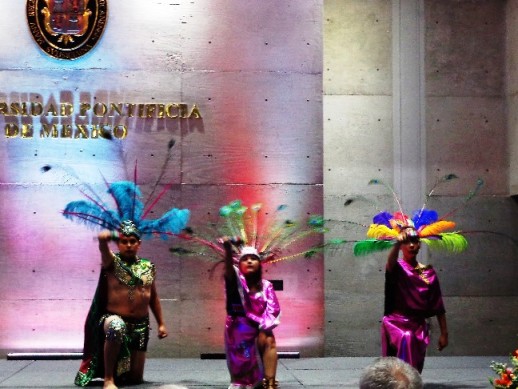
20 Jul 2017 | Focolare Worldwide, Senza categoria
1944: Chiara Lubich left her beloved books in the attic to join the school of the one teacher, Jesus, leaving behind her dream to study philosophy at Catholic University, where she had thought she would be able to know God. Fifty-three years later, Catholic University of Mexico City conferred on her an honorary doctorate in philosophy.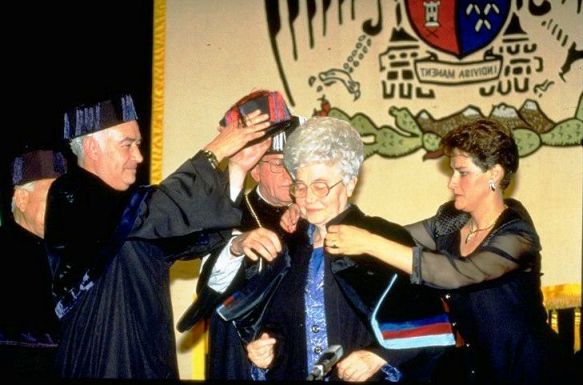 It’s been 20 years since the honorary doctorate, and the Focolare community in Mexico organized three events in memory of her message and to fulfill it: the philosophy of being, the Church as communion, and inculturation. June 29, 2017: “The face of God as communion” was the title of the symposium held at the Pontifical University of Mexico. Msgr Piero Coda, Dean of the Sophia University Institute, conducted two conferences: “Pope Francis: four points for an emerging Church” and “Chiara Lubich: a mysticism of ‘us’ to live through the change.” T
It’s been 20 years since the honorary doctorate, and the Focolare community in Mexico organized three events in memory of her message and to fulfill it: the philosophy of being, the Church as communion, and inculturation. June 29, 2017: “The face of God as communion” was the title of the symposium held at the Pontifical University of Mexico. Msgr Piero Coda, Dean of the Sophia University Institute, conducted two conferences: “Pope Francis: four points for an emerging Church” and “Chiara Lubich: a mysticism of ‘us’ to live through the change.” T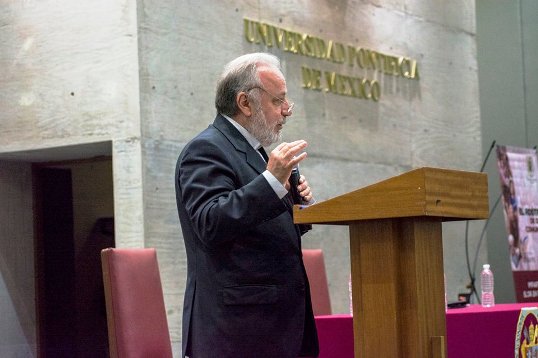 hese two reflections urged those present, mostly priests and men and women religious, towards pastoral work that shows a Church that is merciful, synodal, humble and open. “What surfaced,” affirmed Msgr Coda, “is the need to maintain an open dialogue with the vibrant strength that is in the Mexican church, to enthusiastically take up the challenge of pastoral change as advocated by Pope Francis. This encourages efforts by the laity at a cultural and societal level, working closely with young people, and the work of synods in the Church, where charisms can give their contribution.” June 30, 2017: Welcoming everyone to the hall at La Salle University in Mexico City, Dr Enrique Alejandro González Alvarez, dean of the university, explained the importance of the honoris causa doctorate conferred on Chiara Lubich in 1997. “Through her acceptance, it was she who honored the university,” he said, pointing to the profound harmony between the charism of unity and that of La Salle. “The University identifies with the Focolare Movement, because we work as allies to bring the kingdom of God here on earth, which without a doubt was Chiara’s primary mission,” Alvarez said. “May we continue to tighten the bonds that unite us. This is not only Chiara Lubich’s home, but of all who carry on in her spirit, so that today she can continue to live through her followers.” For the occasion Msgr Coda conducted a conference on “Chiara Lubich’s contribution to a new philosophy of being.” “Chiara’s speech 20 years ago,” Coda said, “showed itself to be prophetic for Mexico, as a new search for meaning and light, and the need for a new cultural paradigm at the social and cultural level. So her talk gave direction and can be connected to the commitment of Sophia University Institute.” New contacts and plans to collaborate were established between Sophia University Institute, the Pontifical University of Mexico and La Salle University.
hese two reflections urged those present, mostly priests and men and women religious, towards pastoral work that shows a Church that is merciful, synodal, humble and open. “What surfaced,” affirmed Msgr Coda, “is the need to maintain an open dialogue with the vibrant strength that is in the Mexican church, to enthusiastically take up the challenge of pastoral change as advocated by Pope Francis. This encourages efforts by the laity at a cultural and societal level, working closely with young people, and the work of synods in the Church, where charisms can give their contribution.” June 30, 2017: Welcoming everyone to the hall at La Salle University in Mexico City, Dr Enrique Alejandro González Alvarez, dean of the university, explained the importance of the honoris causa doctorate conferred on Chiara Lubich in 1997. “Through her acceptance, it was she who honored the university,” he said, pointing to the profound harmony between the charism of unity and that of La Salle. “The University identifies with the Focolare Movement, because we work as allies to bring the kingdom of God here on earth, which without a doubt was Chiara’s primary mission,” Alvarez said. “May we continue to tighten the bonds that unite us. This is not only Chiara Lubich’s home, but of all who carry on in her spirit, so that today she can continue to live through her followers.” For the occasion Msgr Coda conducted a conference on “Chiara Lubich’s contribution to a new philosophy of being.” “Chiara’s speech 20 years ago,” Coda said, “showed itself to be prophetic for Mexico, as a new search for meaning and light, and the need for a new cultural paradigm at the social and cultural level. So her talk gave direction and can be connected to the commitment of Sophia University Institute.” New contacts and plans to collaborate were established between Sophia University Institute, the Pontifical University of Mexico and La Salle University. The Focolare community threw a celebration in honor of June 7, 1997, together with the apostolic nuncio, Msgr Franco Coppola, and the Dean of the Pontifical University of Mexico, Dr Mario Ángel Flores Ramos. There was music, dance, video and testimonies from those present on that memorable day, which served as the perfect context to rediscover the depth of Chiara Lubich’s message. “In the basilica of the Madonna of Guadalupe,” said Maria Voce in her message to the Mexican community, “in front of the ‘Morenita,’ Chiara highlighted the wonderful symbols that Mary clothed herself in, presenting her as an extraordinary example of inculturation.” Chiara’s legacy, which obviously echoed the original message of Guadalupe, still strongly resonates, Focolare’s president said. “Let’s entrust ourselves to her, icon of the ‘culture of meeting,’ so that we might fully ‘make ourselves one’ and bring the spirituality of communion everywhere.”
The Focolare community threw a celebration in honor of June 7, 1997, together with the apostolic nuncio, Msgr Franco Coppola, and the Dean of the Pontifical University of Mexico, Dr Mario Ángel Flores Ramos. There was music, dance, video and testimonies from those present on that memorable day, which served as the perfect context to rediscover the depth of Chiara Lubich’s message. “In the basilica of the Madonna of Guadalupe,” said Maria Voce in her message to the Mexican community, “in front of the ‘Morenita,’ Chiara highlighted the wonderful symbols that Mary clothed herself in, presenting her as an extraordinary example of inculturation.” Chiara’s legacy, which obviously echoed the original message of Guadalupe, still strongly resonates, Focolare’s president said. “Let’s entrust ourselves to her, icon of the ‘culture of meeting,’ so that we might fully ‘make ourselves one’ and bring the spirituality of communion everywhere.”

 Ever since I began my experience in the focolare in Thailand in 1984 I’ve been in ongoing contact with the poor. In 1985, when we took our first trip to Burma – now Myanmar – I was able to touch the extreme poverty with my own hands; up until then I would never have had the opportunity to see it in person. Then, because the civil war in 1988, refugees began arriving from Thailand, especially in the border regions. Their condition? Illness, lonliness, desperation, exploitation and a great longing for a real life. For us focolarini, they represented a face of Jesus crucified and forsaken who we tried to lift up and love. Over these 32 years our help has surely been insufficient, as one can see from the recent humanitariann distaster that isn’t receiving a lot of reporting. No one is ever prepared for the pain of seeing people die. We’ve taken over a projejct begun by Father Justine, Burmese, who died after a long illness. He provided care for the children of migrants who were being left alone at home all day, and so we gave the last monies we had to be able to provide them hospitality. Now the school is called “Drop By Drop, the Latina Bridge Mae Sot.” It’s a collaborative effort between our children in Mae Sot that are originally Birmian and Karen and her friends from a school in Latina, Italy where several Focolare members work. It’s a bridge of solidarity which connects the two cities that are 10,000 km apart, and it has now involved some hundred poeple from many other places. A multi-national transport company helps us to take the containers of collected goods, paying all the customs and clearance fees (€ 1000) to their destination in Mae Sot on the mountains of Thailand.
Ever since I began my experience in the focolare in Thailand in 1984 I’ve been in ongoing contact with the poor. In 1985, when we took our first trip to Burma – now Myanmar – I was able to touch the extreme poverty with my own hands; up until then I would never have had the opportunity to see it in person. Then, because the civil war in 1988, refugees began arriving from Thailand, especially in the border regions. Their condition? Illness, lonliness, desperation, exploitation and a great longing for a real life. For us focolarini, they represented a face of Jesus crucified and forsaken who we tried to lift up and love. Over these 32 years our help has surely been insufficient, as one can see from the recent humanitariann distaster that isn’t receiving a lot of reporting. No one is ever prepared for the pain of seeing people die. We’ve taken over a projejct begun by Father Justine, Burmese, who died after a long illness. He provided care for the children of migrants who were being left alone at home all day, and so we gave the last monies we had to be able to provide them hospitality. Now the school is called “Drop By Drop, the Latina Bridge Mae Sot.” It’s a collaborative effort between our children in Mae Sot that are originally Birmian and Karen and her friends from a school in Latina, Italy where several Focolare members work. It’s a bridge of solidarity which connects the two cities that are 10,000 km apart, and it has now involved some hundred poeple from many other places. A multi-national transport company helps us to take the containers of collected goods, paying all the customs and clearance fees (€ 1000) to their destination in Mae Sot on the mountains of Thailand.  Currently, through Father Joachim from Myanmar, we are helping 200 people who are outside official refugee camps, undocumented and often without food. As Pope Francis puts it, we are experiencing what it means to “touch the flesh of Christ,” one of the many faces of Jesus Forsaken. Besides food, there is great need of love, warmth and affectioin… Chiara Lubich and our spirituality urge us to ‘make ourselves one’ with everyone. One of them said to us: ‘Thank you for everything you get for us,, but especially for making us feel loved. This gives us hope to live.’ There’s an association made up of some friends from Poschiavo in Switzerland, which has been recognized by the government and finances projects that are underway in Thailand, Laos and Vietnam. Six years later it seems like a real miracle!
Currently, through Father Joachim from Myanmar, we are helping 200 people who are outside official refugee camps, undocumented and often without food. As Pope Francis puts it, we are experiencing what it means to “touch the flesh of Christ,” one of the many faces of Jesus Forsaken. Besides food, there is great need of love, warmth and affectioin… Chiara Lubich and our spirituality urge us to ‘make ourselves one’ with everyone. One of them said to us: ‘Thank you for everything you get for us,, but especially for making us feel loved. This gives us hope to live.’ There’s an association made up of some friends from Poschiavo in Switzerland, which has been recognized by the government and finances projects that are underway in Thailand, Laos and Vietnam. Six years later it seems like a real miracle!  The projects in Vietnam are located in the southern zone, towards the Mekong Delta, in a parish. We build and repair small houses, wells with potable water; and we build bridges that are very useful for communication among the small islands.The so-called monkey bridges, constructed with bamboo stems are substituted with bridges made for humans with iron and cement. Now we’ve begun to work in the mountains too, in central Vietnam, in the zone of Gia Lai, which was known for the battles during the war. The Church is very involved in that zone and the poverty level has really reached levels of high concern in the mountain villages, especially among ethnic populations. In Laos we provide assistance for children through priests who have spent time at the priest school in Taygayta, Philippines. The help is sustained by genuine friendship, much creativity and a willingness to work. Love is like a bridge that joins everyone in a common dream: to live universal brotherhood concretely. Our budget? Free donations from many ordinary and also poor people. We feel that if God wants this project to carry on, he’ll provide for it. Luigi Butori Website: www.gocciadopogoccia.ch Facebook page
The projects in Vietnam are located in the southern zone, towards the Mekong Delta, in a parish. We build and repair small houses, wells with potable water; and we build bridges that are very useful for communication among the small islands.The so-called monkey bridges, constructed with bamboo stems are substituted with bridges made for humans with iron and cement. Now we’ve begun to work in the mountains too, in central Vietnam, in the zone of Gia Lai, which was known for the battles during the war. The Church is very involved in that zone and the poverty level has really reached levels of high concern in the mountain villages, especially among ethnic populations. In Laos we provide assistance for children through priests who have spent time at the priest school in Taygayta, Philippines. The help is sustained by genuine friendship, much creativity and a willingness to work. Love is like a bridge that joins everyone in a common dream: to live universal brotherhood concretely. Our budget? Free donations from many ordinary and also poor people. We feel that if God wants this project to carry on, he’ll provide for it. Luigi Butori Website: www.gocciadopogoccia.ch Facebook page




 “Every life has hope.” This is the recurring theme of
“Every life has hope.” This is the recurring theme of Our adrenaline was really pumping just as we got on stage to give the best of ourselves, while fear and worry seemed to disappear as we encouraged each another. Several said: “We felt a strength from above that was supporting us and instilling faith in ourselves.” “The thing I learned was never to stop during the show because of a mistake: this made me think a lot. I’ll carry this into my daily life, always continuing on in spite of the failures.”
Our adrenaline was really pumping just as we got on stage to give the best of ourselves, while fear and worry seemed to disappear as we encouraged each another. Several said: “We felt a strength from above that was supporting us and instilling faith in ourselves.” “The thing I learned was never to stop during the show because of a mistake: this made me think a lot. I’ll carry this into my daily life, always continuing on in spite of the failures.” 
 It’s been 20 years since the honorary doctorate, and the Focolare community in Mexico organized three events in memory of her message and to fulfill it: the philosophy of being, the Church as communion, and inculturation. June 29, 2017: “The face of God as communion” was the title of the symposium held at the Pontifical University of Mexico. Msgr Piero Coda, Dean of the
It’s been 20 years since the honorary doctorate, and the Focolare community in Mexico organized three events in memory of her message and to fulfill it: the philosophy of being, the Church as communion, and inculturation. June 29, 2017: “The face of God as communion” was the title of the symposium held at the Pontifical University of Mexico. Msgr Piero Coda, Dean of the  hese two reflections urged those present, mostly priests and men and women religious, towards pastoral work that shows a Church that is merciful, synodal, humble and open. “What surfaced,” affirmed Msgr Coda, “is the need to maintain an open dialogue with the vibrant strength that is in the Mexican church, to enthusiastically take up the challenge of pastoral change as advocated by Pope Francis. This encourages efforts by the laity at a cultural and societal level, working closely with young people, and the work of synods in the Church, where charisms can give their contribution.” June 30, 2017: Welcoming everyone to the hall at La Salle University in Mexico City, Dr Enrique Alejandro González Alvarez, dean of the university, explained the importance of the honoris causa doctorate conferred on Chiara Lubich in 1997. “Through her acceptance, it was she who honored the university,” he said, pointing to the profound harmony between the charism of unity and that of La Salle. “The University identifies with the Focolare Movement, because we work as allies to bring the kingdom of God here on earth, which without a doubt was Chiara’s primary mission,” Alvarez said. “May we continue to tighten the bonds that unite us. This is not only Chiara Lubich’s home, but of all who carry on in her spirit, so that today she can continue to live through her followers.” For the occasion Msgr Coda conducted a conference on “Chiara Lubich’s contribution to a new philosophy of being.” “Chiara’s speech 20 years ago,” Coda said, “showed itself to be prophetic for Mexico, as a new search for meaning and light, and the need for a new cultural paradigm at the social and cultural level. So her talk gave direction and can be connected to the commitment of Sophia University Institute.” New contacts and plans to collaborate were established between Sophia University Institute, the Pontifical University of Mexico and La Salle University.
hese two reflections urged those present, mostly priests and men and women religious, towards pastoral work that shows a Church that is merciful, synodal, humble and open. “What surfaced,” affirmed Msgr Coda, “is the need to maintain an open dialogue with the vibrant strength that is in the Mexican church, to enthusiastically take up the challenge of pastoral change as advocated by Pope Francis. This encourages efforts by the laity at a cultural and societal level, working closely with young people, and the work of synods in the Church, where charisms can give their contribution.” June 30, 2017: Welcoming everyone to the hall at La Salle University in Mexico City, Dr Enrique Alejandro González Alvarez, dean of the university, explained the importance of the honoris causa doctorate conferred on Chiara Lubich in 1997. “Through her acceptance, it was she who honored the university,” he said, pointing to the profound harmony between the charism of unity and that of La Salle. “The University identifies with the Focolare Movement, because we work as allies to bring the kingdom of God here on earth, which without a doubt was Chiara’s primary mission,” Alvarez said. “May we continue to tighten the bonds that unite us. This is not only Chiara Lubich’s home, but of all who carry on in her spirit, so that today she can continue to live through her followers.” For the occasion Msgr Coda conducted a conference on “Chiara Lubich’s contribution to a new philosophy of being.” “Chiara’s speech 20 years ago,” Coda said, “showed itself to be prophetic for Mexico, as a new search for meaning and light, and the need for a new cultural paradigm at the social and cultural level. So her talk gave direction and can be connected to the commitment of Sophia University Institute.” New contacts and plans to collaborate were established between Sophia University Institute, the Pontifical University of Mexico and La Salle University.